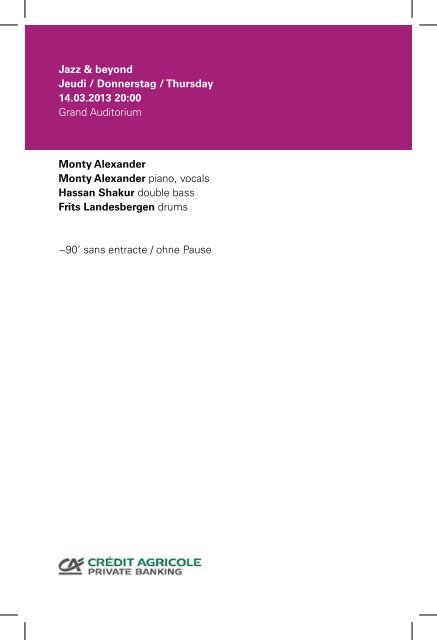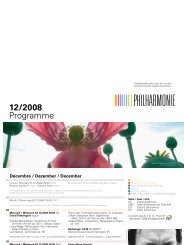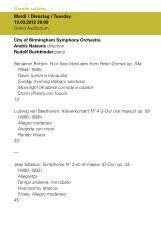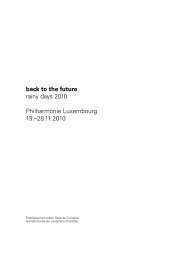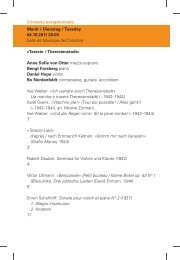Monty Alexander Monty Alexander piano, vocals Hassan Shakur ...
Monty Alexander Monty Alexander piano, vocals Hassan Shakur ...
Monty Alexander Monty Alexander piano, vocals Hassan Shakur ...
You also want an ePaper? Increase the reach of your titles
YUMPU automatically turns print PDFs into web optimized ePapers that Google loves.
Jazz & beyond<br />
Jeudi / Donnerstag / Thursday<br />
14.03.2013 20:00<br />
Grand Auditorium<br />
<strong>Monty</strong> <strong>Alexander</strong><br />
<strong>Monty</strong> <strong>Alexander</strong> <strong>piano</strong>, <strong>vocals</strong><br />
<strong>Hassan</strong> <strong>Shakur</strong> double bass<br />
Frits Landesbergen drums<br />
~90’ sans entracte / ohne Pause
Crédit Agricole Luxembourg soutient depuis<br />
toujours la création artistique et le confirme<br />
de nouveau en 2013 à travers son partenariat<br />
avec la Philharmonie Luxembourg.<br />
Nous sommes heureux d’accueillir ce soir le<br />
trio de <strong>Monty</strong> <strong>Alexander</strong>, l’un des plus grands<br />
pianistes de jazz qui a côtoyé Frank Sinatra,<br />
Ray Brown, Milt Jackson ou encore Quincy<br />
Jones.<br />
Nous vous souhaitons une excellente soirée.<br />
Jean-François Abadie<br />
Administrateur Délégué<br />
Crédit Agricole Luxembourg
Jamaïcan jazz<br />
<strong>Monty</strong> <strong>Alexander</strong><br />
Philippe Gonin<br />
Cinquante ans de carrière et presque autant d’albums publiés<br />
sous son nom… musicien prolifique et curieux, <strong>Monty</strong> <strong>Alexander</strong><br />
a, au fil des années, exploré des mondes musicaux divers, depuis<br />
les standards du Real Book of Jazz jusqu’aux hommages rendus à<br />
sa Jamaïque natale, en passant par la chanson, la pop et la soul<br />
music.<br />
Né le 6 juin 1944, il sort son premier disque, «Spunky», à 20 ans.<br />
Enregistré en trio (avec Paul Humphrey à la batterie et Victor<br />
Gaskin à la basse), on y trouve déjà, avec «Jamaïcan Shake», un<br />
thème à la gloire de son île qu’il venait à peine de quitter pour<br />
chercher fortune (une fortune musicale) aux États-Unis. Dès le<br />
départ donc, le trio apparaît comme sa formation de prédilection.<br />
Même s’il s’en écarte parfois, c’est vers elle qu’il revient régulièrement.<br />
Le répertoire de <strong>Monty</strong> <strong>Alexander</strong> ne regarde pas uniquement<br />
du côté des standards du jazz. On y rencontre toutefois quelques<br />
incontournables tels If I Were a Bell ou Autumn Leaves («<strong>Alexander</strong><br />
The Great», 1965), Now is The Time de Parker («Love and Sunshine»,<br />
1975), Girl Talk (le «Dansez Sur Moi» de Nougaro dans<br />
«Zing», album de 1967) ou encore So What de Miles – dans le<br />
solo duquel, malicieux, il insère une brève citation de «Tico Tico».<br />
Au début des années 1970, il s’intéresse au répertoire des Beatles,<br />
reprenant «Something» ou «Let it Be» («Taste of Freedom», 1970)<br />
et publiant en 1972 «Here Comes The Sun» dans un album au titre<br />
éponyme. Il donne à entendre également deux belles versions de<br />
4
«You are The Sunshine of My Life» (sur «Here Comes The Sun») et<br />
de «Isn’t She Lovely» («Estade», 1977) de Stevie Wonder, montrant<br />
notamment son attrait pour un groove funky soul dont nous<br />
reparlerons plus avant dans ce texte (il reprend aussi le fameux<br />
«Theme From Shaft» d’Isaac Hayes ainsi que «Ben» du tout jeune<br />
Michael Jackson dans «Perception!» paru en 1974.).<br />
Quelques thèmes classiques ont également droit à un traitement<br />
de faveur: c’est d’abord le Nocturne en mi bémol de Chopin sur<br />
«Zing» et c’est aussi le Concerto d’Aranjuez dont il donne sa propre<br />
lecture dans «Perception!» encore. La liste serait trop longue<br />
pour être intégralement passée en revue ici, signalons juste quelques<br />
thèmes de film, de Michel Legrand d’abord («Theme from<br />
Summer of ’42») ou celui de «Love Story», tous deux dans «We’ve<br />
Only Just Begun» (1971), ainsi que le thème composé par Elmer<br />
Bernstein pour les «Sept Mercenaires» («The Magnificent Seven»)<br />
(«Zing»)<br />
À la Jamaïque…<br />
S’il est une constante dans l’œuvre de <strong>Monty</strong> <strong>Alexander</strong>, outre<br />
une formule en trio, c’est cette référence récurrente à son île<br />
natale, la Jamaïque. C’est là qu’il reçut sans doute son premier<br />
choc musical lors de la venue de Louis Armstrong. Dans l’hommage<br />
qu’il lui rend dans «Caribbean Circle» (1992), il souligne,<br />
dans les notes de pochette: «Je me souviens quand Louis Armstrong<br />
est venu en Jamaïque […]. J’avais vu un film intitulé High<br />
Society [il y avait] énormément de bonnes chansons et de musique<br />
dedans.» Si un appareil dentaire semble avoir empêché le<br />
jeune <strong>Monty</strong> de devenir trompettiste, c’est vers le <strong>piano</strong> qu’il se<br />
dirige alors…<br />
Dès son premier disque, nous l’avons souligné, la Jamaïque et,<br />
plus largement les Caraïbes, avec leurs rythmes et leurs sons si<br />
particuliers – celui des Steel Drums que l’on retrouve dans les<br />
albums du pianiste comme «Cobilimbo» de 1978 ou dans le<br />
«Jamento» paru la même année) – vont imprégner l’œuvre du<br />
pianiste.<br />
5
Mais dans l’imaginaire collectif, la Jamaïque, c’est d’abord le<br />
reggae. Et le reggae a son roi: Bob Marley. S’attaquer à la musique<br />
de celui qui est – à tort ou à raison – le représentant de<br />
cette musique au rythme lancinant est une véritable gageure: en<br />
dégager la lettre n’est pas en avoir l’esprit. Pourtant <strong>Alexander</strong>,<br />
timidement d’abord, en glissant un thème du Maître du reggae<br />
ici ou là, en reprenant (dans «Cobilimbo») un titre d’un autre<br />
maître du genre, Jimmy Cliff (belle version de «Many Rivers To<br />
Cross») se décide finalement à consacrer un album entier à la<br />
musique du compositeur de «Redemption Song»: ce fut en 1999,<br />
«Stir It Up». Et force est de reconnaître qu’une fois encore, le<br />
pianiste se sort avec brio de cet exercice difficile. Il y a dans «Stir<br />
It Up» non seulement la lettre mais aussi l’esprit de Marley flottant<br />
au-dessus de musiciens inspirés. Ce premier essai est suivi<br />
en 2006 d’un second, «Concrete Jungle», tout aussi réussi.<br />
Sa face jamaïcaine est aussi celle de rencontres. Avec le guitariste<br />
Ernest Ranglin tout d’abord – qui joue entre autres sur «Cobilimbo».<br />
Méconnu du grand public, Ranglin est un musicien de<br />
studio de renom qui a publié quelques albums sous son nom<br />
comme le très beau «Below The Bassline» dans lequel se trouve,<br />
en guest, un certain… <strong>Monty</strong> <strong>Alexander</strong>. Les deux hommes publient<br />
en 2004 «Rocksteady». Mais le pianiste va aussi travailler<br />
avec la quintessence de la rythmique reggae, les maîtres du genre<br />
que sont Sly et Robbie. Pourtant, contre toute attente mais fort<br />
intelligemment, ce n’est pas sur le terrain où on les attend que<br />
les comparses vont s’aventurer mais ailleurs. <strong>Alexander</strong> le dit très<br />
justement: «Nous pensions au départ monter quelques pièces<br />
aux saveurs jamaïcaines, mais nous sommes restés loin de cette<br />
idée parce que nous ne voulions pas nous étendre sur ce thème.<br />
Nous avons alors décidé de programmer quelques pièces populaires<br />
de la fin des années 1950 et des années 1960 […] chacune<br />
est une part de la culture des gens qui aiment la soul, la funk<br />
et le jazz.» (notes de pochettes de l’album). C’est ainsi que ce<br />
«tribute» à une époque de la musique noire américaine voit le<br />
jour et que l’on peut entendre Sly, Robbie et <strong>Alexander</strong> – plus<br />
quelques acolytes – donner leur version du «Chameleon» de Herbie<br />
Hancock ou du «Moanin’» d’Art Blakey, le tout côtoyant quelques<br />
6
thèmes originaux: l’album «<strong>Monty</strong> meets Sly and Robbie» sort<br />
à l’aube du nouveau millénaire.<br />
Tribute<br />
Si la Jamaïque et son héros musical sont donc l’objet, tout<br />
comme la soul music et un certain jazz, d’une attention particulière,<br />
<strong>Monty</strong> <strong>Alexander</strong> aime aussi rendre hommage aux musiciens<br />
qui l’ont marqué. Outre les thèmes repris et disséminés<br />
dans les albums, outre les deux hommages «monographiques»<br />
rendus à Marley, c’est à Ellington qu’il consacre un album entier<br />
avec son «Duke Ellington Song Book» de 1983. Nat King<br />
Cole, qui fut déjà le centre de «To Nat With Love» en 1986,<br />
est à nouveau l’objet de son attention dans «Calypso Blues» de<br />
2009. Il fut précédé de «The Good Life» (2008) album réunissant<br />
quelques-unes des chansons interprétées par Tony Bennett dont<br />
«La Belle Vie» («The Good Life») de Sacha Distel. Bennett l’invite<br />
d’ailleurs la même année à participer à son album de Noël,<br />
«A Swinging Christmas.»<br />
The Art of Trio<br />
Au-delà de ces «tribute», de ces participations aux projets d’autres<br />
artistes (on le trouve souvent aux côtés de Milt Jackson ou Ray<br />
Brown), on constate que <strong>Monty</strong> <strong>Alexander</strong>, sans cesse, revient à<br />
cette formule magique du trio. C’est une formation qui semble<br />
lui convenir à merveille, laissant l’espace libre aux trois musiciens<br />
pour pouvoir s’exprimer tout en restant réunis par une cohésion<br />
sonore indispensable. C’est Dave Brubeck d’ailleurs qui<br />
en 1974 écrivait dans les notes de pochette de «Perception!»:<br />
«<strong>Monty</strong> <strong>Alexander</strong>, «Senator» Eugene Wright et Bobby Dorham<br />
abordent le classique triumvirat <strong>piano</strong>, basse, batterie avec juste ce qu’il<br />
faut de personnalité tempérée par la conscience de groupe pour parvenir<br />
au triomphe. De nombreux pianistes de jazz ont à un moment ou un<br />
autre de leur carrière choisi ce medium. Le <strong>Monty</strong> <strong>Alexander</strong> Trio a cet<br />
indéfinissable supplément d’âme, de vitalité, qui rend l’auditeur immédiatement<br />
conscient qu’il est confronté à une force avec laquelle il faut<br />
compter, et non un «lounge group» de plus.»<br />
9
Quel meilleur adoubement que celui-ci? Et ces mots, écrits alors<br />
que <strong>Monty</strong> <strong>Alexander</strong> avait une dizaine d’années d’expérience<br />
en qualité de leader, pourraient s’appliquer à chacune des formations<br />
en trio qu’il a dirigées. Si nous empruntons le titre de<br />
ce paragraphe à Brad Mehldau, c’est aussi qu’il s’applique sans<br />
doute aucun au travail d’un <strong>Monty</strong> <strong>Alexander</strong> maîtrisant à merveille,<br />
quels que soient les hommes qui l’entourent, cet art difficile<br />
du trio jazz.<br />
S’il sut certes explorer ce que Brubeck nomme le «classique triumvirat»<br />
du jazz, travaillant à de nombreuses reprises avec la célèbre<br />
paire Clayton/Hamilton (écoutez l’admirable «Live in Holland»<br />
de 1978 ou «Li’l Darlin» de 1986), avec Ray Brown et Herb<br />
Ellis (les trois volumes intitulés «Triple Treat» – parus respectivement<br />
en 1982 pour le premier et 1987 pour les deux suivants),<br />
avec John Patitucci et Troy Davis («Echoes of Jilly’s», 1992) ou<br />
bien encore, en 1986, avec N.H Ørsted Pedersen (basse) et Grady<br />
Tate (drums et chant), il se restreint parfois au duo – c’est ainsi<br />
qu’il enregistre avec le seul John Clayton son «Duke Ellington<br />
Song Book» en 1984 – voire au solo («Solo», 1998), le trio est<br />
aujourd’hui encore au cœur de ses projets.<br />
«The main thing is that I have these terrific guys<br />
playing with me!» (<strong>Monty</strong> <strong>Alexander</strong>)<br />
Depuis 2011 et la parution de deux albums, <strong>Monty</strong> <strong>Alexander</strong> se<br />
partage pour l’essentiel entre deux projets: le Harlem-Kingston<br />
Express d’une part, sorte de savant mélange entre un trio jazz<br />
et un orchestre reggae dont le «Live!» est la dernière production<br />
discographique et une nouvelle formule en trio réunissant <strong>Hassan</strong><br />
<strong>Shakur</strong> à la basse et Frits Landesbergen à la batterie. «Uplift»,<br />
paru en 2011, donne un aperçu de cette formation (notons que<br />
sur l’album, Landesbugen n’apparaît que sur un titre, les baguettes<br />
étant tenues sur le reste de l’album par Herlin Riley.<br />
<strong>Hassan</strong> <strong>Shakur</strong> n’est pas un inconnu. Né J.J. Wiggins en 1956, il<br />
apprend la basse dès l’âge de quatre ans! À douze, il devient le<br />
bassiste du Craig Hundley Trio et rejoint à dix-huit le prestigieux<br />
Duke Ellington Orchestra. On le trouve aux côtés d’Ella Fitzge-<br />
10
ald, Dizzy Gillespie, Milt Jackson ou Herb Ellis et il joue depuis<br />
quelques années avec le quartet de Bill Easley. On a déjà pu l’entendre<br />
sur disque aux côtés de <strong>Monty</strong> <strong>Alexander</strong> dans «Concrete<br />
Jungle» et dans le «Paris Concert» (live au New Morning) de<br />
2008. On connaît moins peut-être Frits Landesbergen. Batteur<br />
et vibraphoniste, né en 1961, ce musicien néerlandais dirige<br />
dès 1987 sa propre formation avec laquelle il publie quelques<br />
albums. Il croise d’ailleurs la route de Jeff Hamilton en 1996 sur<br />
«Dynavibes».<br />
2012 est l’année «d’Uplift 2», suite tout aussi réussie du précédent<br />
où se côtoie thèmes ellingtoniens (Love You Madly), traditionnels<br />
(When The Saints) ou blues («Got My Mojo Workin’»)<br />
Laissons le dernier mot à <strong>Monty</strong> <strong>Alexander</strong>, en espérant que son<br />
souhait, ce soir, se réalise pleinement… «Mon espoir est qu’à la<br />
fin d’un concert […] chacun soit pris par un sentiment d’ascension.<br />
C’est toujours ce que j’ai voulu faire.» (<strong>Monty</strong> <strong>Alexander</strong>)<br />
12
Der Klavierspieler<br />
mit der karibischen Note<br />
<strong>Monty</strong> <strong>Alexander</strong><br />
Franz X.A. Zipperer<br />
Seine aufregenden Triobesetzungen haben Ihn berühmt gemacht.<br />
Eine solche Besetzung hat Pianist, Melodica-Spieler und<br />
Sänger <strong>Monty</strong> <strong>Alexander</strong> auch für das Konzert in der Philharmonie<br />
gewählt. Kontrabassist <strong>Hassan</strong> <strong>Shakur</strong> und Schlagzeuger<br />
Frits Landesbergen begleiten ihn. Sein Spiel ist einerseits geprägt<br />
durch die elegante und rasant swingende melodische Tradition<br />
eines Oscar Peterson und andererseits durch die Anmutung der<br />
Leichtigkeit der karibischen Calypso-Rhytmen seiner jamaikanischen<br />
Heimat. Darüber hinaus hat er mit Gott, der Welt und<br />
allen Größen der Unterhaltung gespielt und aufgenommen:<br />
Frank Sinatra, Tony Bennett, Ray Brown, Dizzy Gillespie, Sonny<br />
Rollins, Clark Terry, Quincy Jones, Ernest Ranglin, Barbara Hendricks,<br />
Bill Cosby, Bobby McFerrin, Sly Dunbar und Robbie<br />
Shakespeare. Über eine Zeitspanne von fünf Dekaden sind dabei<br />
62 Platten herausgekommen. Zuletzt seine von der Kritik hoch<br />
gelobte «Uplift» aus dem Jahre 2011. Bei dieser Aufnahme spielt<br />
<strong>Monty</strong> <strong>Alexander</strong> zusammen mit den Schlagzeugern Herlin<br />
Riley und Frits Landesbergen sowie dem Bassisten <strong>Hassan</strong> <strong>Shakur</strong>.<br />
Letztere teilen sich auch in Luxemburg die Bühne mit <strong>Monty</strong><br />
<strong>Alexander</strong>.<br />
Jugend unter karibischer Sonne<br />
<strong>Monty</strong> <strong>Alexander</strong>, der mit vollem Namen Montgomery Bernard<br />
<strong>Alexander</strong> heißt, kommt am 6. Juni 1944 in Kingston, Jamaika<br />
unter karibischer Sonne zur Welt. Im kindlichen Alter von vier<br />
Jahren sitzt er zum ersten Mal am Klavier, das in der Wohnung<br />
der <strong>Alexander</strong>s steht. «Ich setzte mich einfach auf den Klavierhocker,<br />
und es gelang mir, einfach so kleine Melodien zu spielen», erinnert er<br />
14
sich. «Schließlich schickten mich meine Eltern zu einem klassischen Klavierlehrer.<br />
Ich versuchte ganz diszipliniert, diese Musik nach ihren Gesetzmäßigkeiten<br />
zu spielen. Doch ich scheiterte. Auch weil ich dagegen<br />
rebellierte. Ich wollte die Jazzstücke und andere populäre Musik spielen,<br />
die ich dem Radio und aus Filmen kannte.» Als er dann im Carib<br />
Theater von Kingston Louis Armstrong und Nat «King» Cole in<br />
Konzerten erlebt, öffnet sich für den Teenager <strong>Monty</strong> <strong>Alexander</strong><br />
die Türe zum Jazz. «Ich kannte Louis Armstrong aus Filmen», fährt<br />
<strong>Monty</strong> <strong>Alexander</strong> fort, «und ich war sofort ergriffen, als ein Konzert<br />
in Jamaika angekündigt wurde. Es war der bis dato größte Kick in<br />
meinem Leben. Ich schüttelte ihm nach dem Konzert voller Inbrunst die<br />
Hände. Und bis heute ist es mein Ziel geblieben, das zu tun, was er immer<br />
getan hat. Er sorgte mit seinen Klängen dafür, dass es den Leuten<br />
gut geht.»<br />
In den späten 1950er Jahren formiert er seine erste Band, die<br />
Calypso-Truppe <strong>Monty</strong> and the Cyclones, und ist in den lokalen<br />
Clubs ziemlich populär. Er schafft es sogar in das legendäre<br />
Studio One und arbeitet nicht nur mit dem legendären Produzenten<br />
Clement «Coxsone» Dodd, der in den 1950er und 1960er<br />
Jahren den Genres Ska und Reggae den weltweiten Weg ebnet,<br />
sondern nimmt beispielsweise mit Toots Hibbert auf, der sich<br />
später mit The Maytals einen großen Namen macht. Bei Sessions<br />
ist <strong>Monty</strong> <strong>Alexander</strong> auch mit Musikern zu hören, die später<br />
in der Formation The Skatelites wieder auftauchen und auch<br />
Bob Marley anfangs begleiten. Hier kreuzt er erstmals den Weg<br />
des Gitarristen Ernest Ranglin. Und diese Begegnung sollte prägend<br />
sein. All das geschieht zu einer Zeit, als die Grenzen zwischen<br />
Ska, Jazz und populärer Musik noch nicht so scharf und<br />
unerbittlich gezogen werden wie heute. Eine Grenzziehung, die<br />
<strong>Monty</strong> <strong>Alexander</strong> bis heute nicht akzeptiert. «Meine Herkunft aus<br />
Jamaika hat in mir ebensolche kulturelle Wurzeln gelegt, wie mein Leben<br />
in den USA auch», erklärt er. «Für mich ist es daher immer wichtig<br />
gewesen, beide musikalischen Welten zur gleichen Zeit zusammen zu<br />
bringen. Vor allem geht es auch immer darum, zu zeigen, dass so etwas<br />
geht. Es gibt da dieses Lied von Bob Marley, ‹One Love›. Besser als dieser<br />
Stücktitel kann ich es auch nicht erklären. Jazz und Jamaika – es ist<br />
letztlich die eine Liebe.»<br />
15
Wildes Besetzungs-Ping-Pong<br />
<strong>Monty</strong> <strong>Alexander</strong> verlässt mit seiner Familie die Karibikinsel<br />
1961 und zieht nach Miami im US-amerikanischen Florida.<br />
Doch bereits ein Jahr später, 1962 macht er sich nach New York<br />
auf. Dort wird Jilly’s Saloon, der mitten in Manhattan gelegene<br />
Jazzclub des schillernden Italo-Amerikaners Jilly Rizzo, sein<br />
zweites Wohnzimmer. Stars und Sternchen (nicht nur musikalische)<br />
gehen dort ein und aus, darunter Frank Sinatra. So bleibt<br />
es natürlich nicht aus, dass <strong>Monty</strong> <strong>Alexander</strong> auch mit ihm<br />
spielt. Auch andere wichtige, musikalische Freundschaften entstehen<br />
dort, unter anderem die mit Bassist Ray Brown oder Vibraphonist<br />
Milt Jackson. Um die Chance zu haben, mit möglichst<br />
vielen hochkarätigen amerikanischen Jazzmusikern spielen<br />
zu können, verbannte <strong>Monty</strong> <strong>Alexander</strong> seine Calypso-Wurzeln<br />
ganz in den Hintergrund seines musikalischen Klangkosmos.<br />
«Wenn du von ganz woanders her kommst und dich in den großen Jazzclubs<br />
New Yorks tummeln willst, dann willst du erst einmal unbedingt<br />
dazugehören», sagt er, «du ordnest dich ein, du ordnest dich unter. Und<br />
vergisst dabei sogar deine Wurzeln, die dich kreativ geprägt haben.»<br />
Auch das erste Album lässt nicht lange auf sich warten, 1964<br />
nimmt er «<strong>Alexander</strong> The Great» auf. Mit von der Partie sind<br />
dabei Bassist Victor Gaskin und Schlagzeuger Paul Humphrey.<br />
Schon damals blitzt das auf, was <strong>Monty</strong> <strong>Alexander</strong>s bis heute<br />
so aufregend gestaltet: die Kraft eine großen Vokalisten, seine<br />
perkussive linke Hand und seine Improvisation, die zwischen<br />
Melodienoten und dissonante Akkorde hin- und herwirbelt.<br />
Von da an geht es Schlag auf Schlag. Er nimmt CDs auf und<br />
konzertiert unter anderem mit den Sängerinnen Ernestine Anderson<br />
und Mary Stallings. Großartige Bandleader berufen<br />
<strong>Monty</strong> <strong>Alexander</strong> in Formationen, etwa Dizzy Gillespie, Benny<br />
Golson, Jimmy Griffin oder Frank Morgan. In seine ersten erfolgreichen<br />
Trios finden sich Musiker wie Gitarrist Herb Ellis,<br />
den Bassisten Ray Brown, Mads Vinding, Niels-Henning Ørsted<br />
Pedersen oder Schlagzeuger Ed Thigpen. Mitte der 1970er Jahre<br />
kommt er mit einer Triobesetzung um die Ecke, die die Szene so<br />
richtig aufmischt: John Clayton am Bass und Jeff Hamilton am<br />
Schlagzeug. Ihr meisterhafter Pianoswing kulminiert in der Platte<br />
17
Montreux <strong>Alexander</strong>», die im Juli 1976 beim Montreux Jazz Festival<br />
mitgeschnitten wird. Nicht ungenannt dürfen die berauschenden<br />
Alben bleiben, die <strong>Monty</strong> <strong>Alexander</strong> zwischen 1971 und<br />
1977 für MPS – dem ersten deutschen Label, das ausschließlich<br />
Jazzproduktionen vorlegt – einspielt<br />
Durchklingen der Karibik<br />
Pianoswing hin, Pianoswing her – nach vielen Reisen in sein<br />
Heimatland Jamaika beginnt <strong>Monty</strong> <strong>Alexander</strong> mehr und mehr<br />
die Klangwelt der Insel für sich neu zu entdecken. «Ich habe zwar<br />
den Calypso und die heimische Insel hinter mir gelassen, aber nie aus<br />
meinem Kopf verbannt», reflektiert er, «doch mit den Jahren bin ich<br />
häufiger auf die Karibikinsel zurück gekehrt. Dabei habe ich erkannt,<br />
was an diesem kulturellen Erbe habe, das ich nun mal mit mir rumtrage<br />
und habe angefangen, meine Musik neu auszurichten. Ich war<br />
schon besessen von Rhythmus. Der karibische Rhythmus ist dabei wie<br />
die Sonnen, die morgens aufgeht. So grundlegend wie der Schlag deines<br />
Herzens.» In der Folgezeit nimmt <strong>Monty</strong> <strong>Alexander</strong> Kontakt<br />
zu einem Uralt-Freund und Jamaika-Auswanderer, dem Gitarristen<br />
Ernest Ranglin, auf und spielt wieder mit oder er lädt<br />
sich den Steelpan-Spieler Othello Molineaux ins Studio. 1990<br />
formiert <strong>Monty</strong> <strong>Alexander</strong> eine Reggae-Band, eine Art Jamaika<br />
Allstar-Truppe, auch wieder mit Ernest Ranglin. Mit den Alben<br />
«Yard Movement» oder «Stir It Up», einer Kollektion von Bob-<br />
Marley-Liedern entwickelt er Jazz-Reggae. Wer den Höhepunkt<br />
dieser Koalition aus Jazz und Reggae erleben will, dem seien die<br />
Aufnahmen auf «Harlem-Kingston Express Live» ans Herz gelegt.<br />
Dort erkundet er so gekonnt nicht nur die klassischen Verbindungen<br />
zwischen traditionellem Reggae und purem Jazz. Er<br />
schafft damit auch neue.<br />
Rückblickend auf die letzten 50 Jahre seines künstlerischen<br />
Schaffens und den wilden Besetzungs-Ping-Pong seiner Formationen<br />
sagt <strong>Monty</strong> <strong>Alexander</strong>: «Ich bin eben einer dieser Musiker, die<br />
es lieben, sich in so vielen unterschiedlichen kreativen Momenten wieder<br />
zu finden. Das hat über die Jahre auch sehr tiefe künstlerische Freundschaften<br />
mit sich gebracht. Auch mit Musikern, die man sonst eher nicht<br />
miteinander in Verbindung bringt. Ich war und bin der klassische Ver-<br />
18
20<br />
bindungsmann. Das dies schon 50 Jahre währt, war mir so gar nicht bewusst.<br />
Ich werde auch in Zukunft nicht aufhören, meine sehr verschiedenen<br />
musikalischen Welten mit möglichst vielen Künstlern und Zuhörern<br />
zu teilen.» Es ist genau diese ausgeprägt vielfältige Herangehensweise<br />
von <strong>Monty</strong> <strong>Alexander</strong>, die ein Konzert für die Zuhörer<br />
so überaus spannend macht. Selbst großen Standards des Jazz<br />
verpasst er leuchtend neue Klangkleider, welche die interpretierten<br />
Stücke strahlen lassen, wie selten zuvor. Genauso wie er<br />
es bei Duke Ellington, Louis Armstrong, und Nat Cole bewunderte,<br />
weiß man bei ihm auch nie, wo der Musiker aufhört und<br />
der Entertainer anfängt. Er kriegt beides mit größter Sensibilität<br />
und Lockerheit unter einen Hut. Eine gestandene künstlerische<br />
Persönlichkeit eben, deren Musik voller Leben und deren Leben<br />
voller Musik ist.
Interprète<br />
Biographie<br />
IIIIIIIIIIIIIIIIIIIIIIIIIIIIIIIIIIIIIIIIIIIIIIIIIIIIIIIIIIIIIIIIIIIIIIIIIIIIIIIIIIIIIIIIIIIIIIII<br />
<strong>Monty</strong> <strong>Alexander</strong><br />
En cinq décennies de carrière, le pianiste <strong>Monty</strong> <strong>Alexander</strong> a<br />
acquis la réputation d’explorer et de transcender les univers<br />
du jazz américain, de la chanson populaire et de la musique de<br />
sa Jamaïque natale, abordant chacun de ces styles avec une<br />
expression musicale sincère. Il a ainsi joué et enregistré avec<br />
des artistes venus d’horizons musicaux divers et du monde du<br />
spectacle: Frank Sinatra, Tony Bennett, Ray Brown, Dizzy Gillespie,<br />
Sonny Rollins, Clark Terry, Quincy Jones, Ernest Ranglin,<br />
Barbara Hendricks, Bill Cosby, Bobby McFerrin, Sly Dunbar,<br />
Robbie Shakespeare et bien d’autres. Né le D-Day (6 juin 1944)<br />
et élevé à Kingston, en Jamaïque, il a pris ses premiers cours<br />
de <strong>piano</strong> à l’âge de six ans, bien qu’il se soit en grande partie<br />
formé en autodidacte. Adolescent, il a assisté aux concerts<br />
de Louis Armstrong et de Nat «King» Cole au Carib Theater<br />
de Kingston. Ces artistes ont eu une grande influence sur son<br />
avenir. Il a formé le groupe <strong>Monty</strong> and the Cyclones dans les<br />
années 1950 et a également enregistré avec des musiciens<br />
ayant contribué à la renommée internationale de la musique jamaïcaine,<br />
tels que The Skatalites (premier backing band de Bob<br />
Marley). <strong>Alexander</strong> et sa famille sont arrivés aux États-Unis fin<br />
1961. Moins de deux ans plus tard, tout en jouant à Las Vegas<br />
avec l’Art Mooney Orchestra, il a tapé dans l’œil du patron du<br />
club de New York City, Jilly Rizzo et de son ami Frank Sinatra.<br />
Rizzo a engagé le jeune pianiste dans son club, Jilly’s, où il a<br />
accompagné Sinatra et bien d’autres. Il y a rencontré le vibraphoniste<br />
du Modern Jazz Quartet ,Milt Jackson qui l’a engagé<br />
22
photo: Crush Boone<br />
<strong>Monty</strong> <strong>Alexander</strong><br />
et finalement présenté à l’ancien collaborateur de Charlie Parker<br />
et au bassiste légendaire Ray Brown. <strong>Alexander</strong> a enregistré et<br />
joué avec ces deux géants du jazz à de nombreuses occasions.<br />
Ces grandes pointures du jazz ont accueilli <strong>Alexander</strong> au sein<br />
de leur «fraternité musicale» au milieu des années 1960. Parmi<br />
les premiers convaincus par son jeu figurent, entre autres,<br />
Duke Ellington, Count Basie, et Miles Davis. Les collaborations<br />
de <strong>Monty</strong> <strong>Alexander</strong> transcendent les genres, styles et générations.<br />
Ses projets sont aussi variés qu’assister Natalie Cole<br />
dans son album en hommage à son père, «Nat King Cole» en<br />
23
24<br />
1991 (album inoubliable récompensé de sept Grammys), jouer<br />
la Rhapsody in Blue de George Gershwin sous la direction de<br />
Bobby McFerrin au Verbier Festival en Suisse ou enregistrer la<br />
partie de <strong>piano</strong> du film Bird de Clint Eastwood. En août 2000, le<br />
gouvernement jamaïcain a accordé à <strong>Monty</strong> <strong>Alexander</strong> le titre<br />
de Commandeur de l’Ordre de distinction pour son extraordinaire<br />
contribution à la Jamaïque. Dans le livre The Fifty Greatest<br />
Jazz Piano Players of All Time (2005) de Hal Leonard, <strong>Alexander</strong><br />
figure parmi les cinq plus grands pianistes de jazz de tous les<br />
temps. L’agenda d’<strong>Alexander</strong> est chargé de tournées à travers<br />
le monde; il joue dans les clubs de jazz, salles de concerts et<br />
festivals de jazz internationaux, aux États-Unis ainsi que sur différents<br />
continents, de l’Europe à l’Asie; à Montreux, Johannesburg<br />
et Cape Town; au Japon, en Russie, en Nouvelle-Zélande,<br />
en Australie, etc. À ce jour, <strong>Monty</strong> <strong>Alexander</strong> a enregistré plus<br />
de 70 albums en tant que leader. Sa collaboration avec le label<br />
Telarc comprend des sessions en trio («Impressions in Blue»)<br />
et des enregistrements de concert en live («Goin’ Yard»). À la<br />
fin de l’été 2005, <strong>Alexander</strong> s’est rendu au Tuff Gong Studio de<br />
Bob Marley à Kingston, en Jamaïque, et s’est associé à d’excellents<br />
musiciens jamaïcains pour enregistrer «Concrete Jungle»,<br />
un album de douze titres de Bob Marley, réinterprétés dans les<br />
arrangements pour <strong>piano</strong> jazz d’<strong>Alexander</strong>. Reflétant son éclectisme,<br />
«The Good Life» (Chesky Records) est un ensemble de<br />
chansons écrites et popularisées par l’un de ses artistes favoris<br />
et un proche ami, Tony Bennett. Sa seconde parution chez<br />
Chesky, «Calypso Blues», est un hommage à un autre de ses<br />
héros, Nat King Cole. En 2008, à l’invitation de Wynton Marsalis,<br />
<strong>Alexander</strong> a imaginé et dirigé avec grand succès le programme<br />
Lords of the West Indies dans le cadre de Jazz at Lincoln<br />
Center, retransmis nationalement sur BETJ. <strong>Alexander</strong> est<br />
retourné à Jazz at Lincoln Center en 2009 avec un nouveau<br />
programme, Harlem Kingston Express, dans lequel il mêle le<br />
jazz classique aux rythmes et vibrations de sa Jamaïque natale.<br />
Au cours de l’hiver 2008, le chanteur iconique américain Tony<br />
Bennett a personnellement invité <strong>Monty</strong> à enregistrer les parties<br />
de <strong>piano</strong> de son album de Noël «A Swinging Christmas»<br />
avec le Count Basie Orchestra. <strong>Monty</strong> apparaît sur la pochette
de l’album, tenant de la dinde, aux côtés de Tony Bennett.<br />
Deux albums parus en 2011 reflètent son plaisir à jouer en live<br />
dans le monde entier: l’album en trio «Uplift» (JLP) et «Harlem-<br />
Kingston Express» (Motema Music). «Harlem Kinston Express<br />
Live!», aussi apprécié par l’industrie discographique que par<br />
les fans, a été nominé aux Grammys en 2012. Entre «Uplift» et<br />
«Harlem-Kingston Express Live!» <strong>Monty</strong> <strong>Alexander</strong> a officiellement<br />
dominé les palmarès des radios aux États-Unis avec trois<br />
spots number 1 en 2011, non seulement «Uplift» resté numéro<br />
1 pendant plusieurs semaines mais aussi «Harlem-Kingston<br />
Express Live» numéro 1 en concurrence aux palmarès jazz et<br />
world music. L’été 2012, <strong>Monty</strong> <strong>Alexander</strong> a été récompensé du<br />
prestigieux German Jazz Trophy, A Life for Jazz et en novembre<br />
2012, il a reçu le Caribbean American Heritage Luminary Award<br />
de l’Institute of Caribbean Studies à Washington.<br />
IIIIIIIIIIIIIIIIIIIIIIIIIIIIIIIIIIIIIIIIIIIIIIIIIIIIIIIIIIIIIIIIIIIIIIIIIIIIIIIIIIIIIIIIIIIIIIII<br />
<strong>Monty</strong> <strong>Alexander</strong><br />
In a career spanning five decades, pianist <strong>Monty</strong> <strong>Alexander</strong> has<br />
built a reputation exploring and bridging the worlds of American<br />
jazz, popular song, and the music of his native Jamaica, finding<br />
in each a sincere spirit of musical expression. In the process,<br />
he has performed and recorded with artists from every corner<br />
of the musical universe and entertainment world: Frank Sinatra,<br />
Tony Bennett, Ray Brown, Dizzy Gillespie, Sonny Rollins,<br />
Clark Terry, Quincy Jones, Ernest Ranglin, Barbara Hendricks,<br />
Bill Cosby, Bobby McFerrin, Sly Dunbar, and Robbie Shakespeare,<br />
among others. Born on D-Day (June 6, 1944) and raised<br />
in Kingston, Jamaica, he took his first <strong>piano</strong> lessons at age six,<br />
although he is largely self-taught. As a teenager, he witnessed<br />
concerts by Louis Armstrong and Nat King Cole at Kingston’s<br />
Carib Theater. These artists had a profound effect on <strong>Alexander</strong>’s<br />
aspirations. He formed <strong>Monty</strong> and the Cyclones in the late<br />
1950s and also recorded on sessions with the musicians who<br />
would catapult Jamaican music to international recognition<br />
as The Skatalites (Bob Marley’s first backing band). <strong>Alexander</strong><br />
and his family came to the United States at the end of 1961.<br />
Less than two years later, while playing in Las Vegas with Art<br />
25
26<br />
Mooney’s orchestra, he caught the eye of New York City club<br />
owner Jilly Rizzo and his friend, Frank Sinatra. Rizzo hired the<br />
young pianist to work in his club, Jilly’s, where he accompanied<br />
Sinatra and others. There he met Modern Jazz Quartet<br />
vibraphonist Milt Jackson, who hired him and eventually introduced<br />
him to former Charlie Parker collaborator and legendary<br />
bassist Ray Brown. <strong>Alexander</strong> recorded and performed with<br />
the two jazz giants on many occasions. Jazz’s greatest luminaries<br />
welcomed <strong>Alexander</strong> to their musical fraternity in the mid-<br />
1960s. Among these earliest enthusiasts for his playing were<br />
none other than Duke Ellington, Count Basie, and Miles Davis.<br />
<strong>Monty</strong> <strong>Alexander</strong>’s collaborations span multiple genres, styles,<br />
and generations. His projects have been as varied as assisting<br />
Natalie Cole in her tribute album to her father, «Nat King<br />
Cole» in 1991 (the resulting album, Unforgettable, won seven<br />
Grammy awards), performing George Gershwin’s Rhapsody in<br />
Blue under the direction of Bobby McFerrin at the Verbier Festival<br />
in Switzerland, and recording the <strong>piano</strong> track for the film<br />
score of Clint Eastwood’s Bird. In August 2000, the Jamaican<br />
government awarded <strong>Monty</strong> <strong>Alexander</strong> the title of Commander<br />
in the Order of Distinction for outstanding services to Jamaica<br />
as a worldwide music ambassador. In Hal Leonard’s 2005 book<br />
The Fifty Greatest Jazz Piano Players of All Time, <strong>Alexander</strong><br />
was listed among the top five Jazz pianists of all time. <strong>Alexander</strong><br />
maintains a rigorous touring schedule worldwide, playing in<br />
jazz clubs, concert halls and playing at international Jazz Festivals<br />
in the USA and across continents; from Europe to Asia; in<br />
Montreux; Johannesburg and Cape Town; and Japan, Russia,<br />
New Zealand, Australia, etc. To date <strong>Monty</strong> <strong>Alexander</strong> has recorded<br />
over 70 albums as a leader. His collaboration with Telarc<br />
label yielded trio sessions («Impressions in Blue») and live concert<br />
recordings («Goin’Yard»). In the late summer of 2005,<br />
<strong>Alexander</strong> traveled to Bob Marley’s Tuff Gong Studio in Kingston,<br />
Jamaica, and teamed up with Jamaican top session players to<br />
record «Concrete Jungle», a set of twelve compositions penned<br />
by Bob Marley and reinterpreted via <strong>Alexander</strong>’s jazz <strong>piano</strong>oriented<br />
arrangements. As a testament to his versatility, «The<br />
Good Life», on Chesky Records is a collection of songs written
and popularized by one of his all-time favorite artists and good<br />
friends, Tony Bennett. His second release on Chesky, «Calypso<br />
Blues», is tribute to another one of his heroes, Nat King Cole.<br />
In 2008, with the invitation of Wynton Marsalis, <strong>Alexander</strong> conceived<br />
and directed the acclaimed program Lords of the West<br />
Indies at Jazz at Lincoln Center, broadcast nationally on BETJ.<br />
<strong>Alexander</strong> returned to Jazz at Lincoln Center in 2009 with a<br />
new program, Harlem Kingston Express in which he merged<br />
classic Jazz with rhythms and vibrations of his native Jamaica.<br />
In the winter of 2008 American singer and icon, Tony Bennett<br />
personally invited <strong>Monty</strong> to record as the featured pianist on<br />
his Christmas album, «A Swinging Christmas», with the Count<br />
Basie Orchestra. <strong>Monty</strong> can be spotted on the album cover,<br />
holding a turkey next to Tony Bennett. Two collections were released<br />
in 2011 that capture the excitement of <strong>Monty</strong> <strong>Alexander</strong>’s<br />
live performances around the world: «Uplift», a trio album<br />
on JLP Records, and «Harlem-Kingston Express» on Motema<br />
Music. «Harlem Kinston Express Live!» was singled out by<br />
both the recording industry and fans and received a Grammy<br />
award nomination in 2012. Between «Uplift» and «Harlem-<br />
Kingston Express Live!» <strong>Monty</strong> <strong>Alexander</strong> has officially dominated<br />
the US radio charts with three number 1 spots in 2011,<br />
as not only Uplift remained at number 1 for several weeks but<br />
«Harlem-Kingston Express Live!» rose to number 1 on Jazz<br />
charts and on World Music charts concurrently. In the summer<br />
of 2012 <strong>Monty</strong> <strong>Alexander</strong> was awarded the prestigious German<br />
Jazz Trophy, A Life for Jazz and in November 2012 he received<br />
the Caribbean American Heritage Luminary Award from the Institute<br />
of Caribbean Studies in Washington, D.C.<br />
27
IIIIIIIIIIIIIIIIIIIIIIIIIIIIIIIIIIIIIIIIIIIIIIIIIIIIIIIIIIIIIIIIIIIIIIIIIIIIIIIIIIIIIIII JAZZ & BEYOND<br />
Prochain concert du cycle «Jazz & beyond»<br />
Nächstes Konzert in der Reihe «Jazz & beyond»<br />
Next concert in the series «Jazz & beyond»<br />
Samedi / Samstag / Saturday 20.04.2013 20:00<br />
Grand Auditorium<br />
Ibrahim Maalouf Wind Quintet<br />
Ibrahim Maalouf trumpet<br />
Frank Woeste <strong>piano</strong><br />
Mark Turner saxophone<br />
Ira Coleman bass<br />
Clarence Penn drums<br />
35
La plupart des programmes du soir de la Philharmonie sont<br />
disponibles avant chaque concert en version PDF sur le site<br />
www.philharmonie.lu<br />
Die meisten Abendprogramme der Philharmonie finden<br />
Sie schon vor dem jeweiligen Konzert als Web-PDF unter<br />
www.philharmonie.lu<br />
your comments are welcome on<br />
www.facebook.com/philharmonie<br />
Impressum<br />
© Etablissement public Salle de Concerts<br />
Grande-Duchesse Joséphine-Charlotte 2013<br />
Pierre Ahlborn, Président<br />
Matthias Naske, Directeur Général<br />
Responsable de la publication: Matthias Naske<br />
Design: Pentagram Design Limited<br />
Print Management: print solutions, Luxembourg<br />
Tous droits réservés.<br />
36


